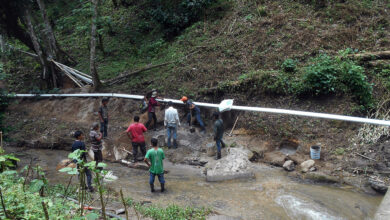World Water Week conference begins in the midst of a drought

Stockholm (Sweden), Aug 30 (EFE) – The World Water Week has begun in the Swedish capital, a meeting that brings together public and private actors to discuss how to preserve the resource, with droughts this summer affecting not only arid places but also countries like Germany and France.
The event, which has been held since 1991, has gathered the international community in Stockholm, bringing together ministers from different countries and representatives from institutions such as the Inter-American Development Bank, NGOs such as The Nature Conservancy and private foundations such as FEMSA, among other organizations.
The conference, which began online last week and will continue as an in-person event until Thursday, takes place in the midst of a drought that has affected many countries that are not normally vulnerable to water scarcity.
In August, the phenomenon has directly affected the economy. In Germany, for example, the low flow of the Rhine River has hindered the transport of goods, and France has been forced to reduce electricity production due to the difficulty of cooling nuclear reactors.
This year, in addition, one more “planetary barrier” – of the nine identified by the Stockholm Resilience Centre – has been crossed: freshwater, according to a recent study led by researcher Lan Wang-Erlandsson and published in the scientific journal Nature.
The research concludes that human use of freshwater has exceeded the safety limit, a condition that “we have never experienced before,” according to Dr. Wang-Erlandsson, who also pointed to water as a possible cause of the increase in methane concentrations in the atmosphere, at the opening of the meeting.
“Food is water, energy is water… everything is connected to water,” Wang-Erlandsson said.
“We are going to experience climate change largely through the water cycle,” stressed specialist Sandra Postel, founder of the Global Water Policy Project, at the ceremony, where the main challenges to be discussed throughout the week were presented.
“We are moving towards a new world of water,” she added, highlighting flood control as “something we will have to deal with more and more,” as well as the replenishment of groundwater and universal access to this resource, among the various topics to be addressed by the experts.
Postel highlighted the importance of the struggle to preserve this resource as one of the “three existential crises” facing humanity – together with climate change and the loss of biodiversity – and stressed the need to find solutions to tackle these three challenges simultaneously.
“In 2022, the water problem is not only applicable to a certain population,” said Hafsa Malim, an analyst at the African Union, who said that now “it is not necessary to live in an arid or semi-arid area to have problems of water scarcity.”
Malim believes that a key issue at the conference will be to determine how the solutions that have proven to be efficient in different countries can be scaled up, and to see if they can be adapted to other contexts. EFE
mmt/icn/lap





